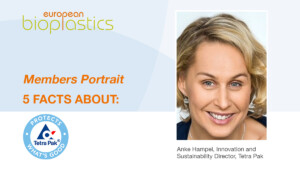 Member portrait: Tetra Pak
Member portrait: Tetra Pak
In each issue of the Bioplastics Newsletter, we present some facts about a member of European Bioplastics. This month, Anke Hampel, Innovation and Sustainability Director of Tetra Pak, shares some interesting insights on her company.
5 facts about Tetra Pak
- A one litre Tetra Pak® carton package is typically made of approximately 70% paperboard, 25% plastic and 5% aluminum. This high share of renewable materials helps to feature a lower carbon footprint than alternative options, such as glass, plastic, or metal packages, as concluded by a 2020 life cycle assessment carried out on behalf of Tetra Pak. The study states, for example, that if for one full year consumers and food producers in Europe would choose beverages packed in Tetra Brik® Edge Aseptic 1L packages with Light-Cap™ 30 openings instead of PET bottles, this would save the equivalent of all CO2 emissions produced by 60,500 cars.
- As part of our journey towards the world’s most sustainable food package – one that is solely made of renewable or recycled materials, is fully recyclable and carbon neutral – we’re continuously exploring sustainable alternatives that shift us from high-carbon, virgin, fossil-based materials to low-carbon, renewable and responsibly sourced ones. Besides introducing recycled materials that can meet our high food safety standards and accelerating our work in the ‘design for recycling’ area – by simplifying the packaging material structure, reducing the usage of virgin, fossil-based resources and increasing the share of paper – we are steadily expanding the usage of renewable plant-based polymers.
- In 2014, we were the first in our industry to introduce a package made fully from plant-based renewable materials. Manufactured with paperboard and sugarcane-based plastic, the Tetra Rex® Plant-based package is fully renewable. Today, we’ve delivered more than 3.5 billion of such packages to customers around the world and, last year, we were the 1st to launch Tetra Rex® Plant-based packaging certified as carbon neutral by Carbon Trust.
- We have accelerated investments so that all our European factories are now capable of producing plant-based polymer coating for carton packages, while continuing development work to extend our fully plant-based offering to other products in our portfolio. These efforts helped us sell 13.5 billion plant-based packages in 2020 alone. And 2021 will see a major increase in the number of plant-based packages sold. We have also produced over 12 billion plant-based caps made from segregated plant-based polymers, fully traceable to their sugarcane origins, ever since their launch in 2011 – another industry first – and have since then saved more than 300,000 tonnes of CO2 emissions through those products.
- We rely on a platform of voluntary certification standards, such as the Forest Stewardship Council™ (FSC™), the Aluminium Stewardship Initiative standard (ASI), and Bonsucro, helping us ensure we meet all the criteria and provisions for protecting biodiversity and natural environments. For instance, the Bonsucro Chain of Custody certification, which Tetra Pak obtained in 2019, was a first in the food and beverage industry and ensures full transparency across the supply chain, from feedstock production to consumption, making our plant-based polymers fully traceable to their sugarcane origin. Since early 2020, all our products made from plant-based polymers are delivered to our customers as Bonsucro-certified and can carry the Bonsucro label. According to Bonsucro – which has certified 5.8% of the world’s sugarcane land and is compliant with the ISEAL Alliance’s Code of Good Practice – of all new membership applications in 2020, 21% were from companies in bioplastic supply chains. Tetra Pak is a particularly active member, responsible – together with its customers – for 41% of all 2020 requests to use the Bonsucro-certified sustainable sugarcane logo.